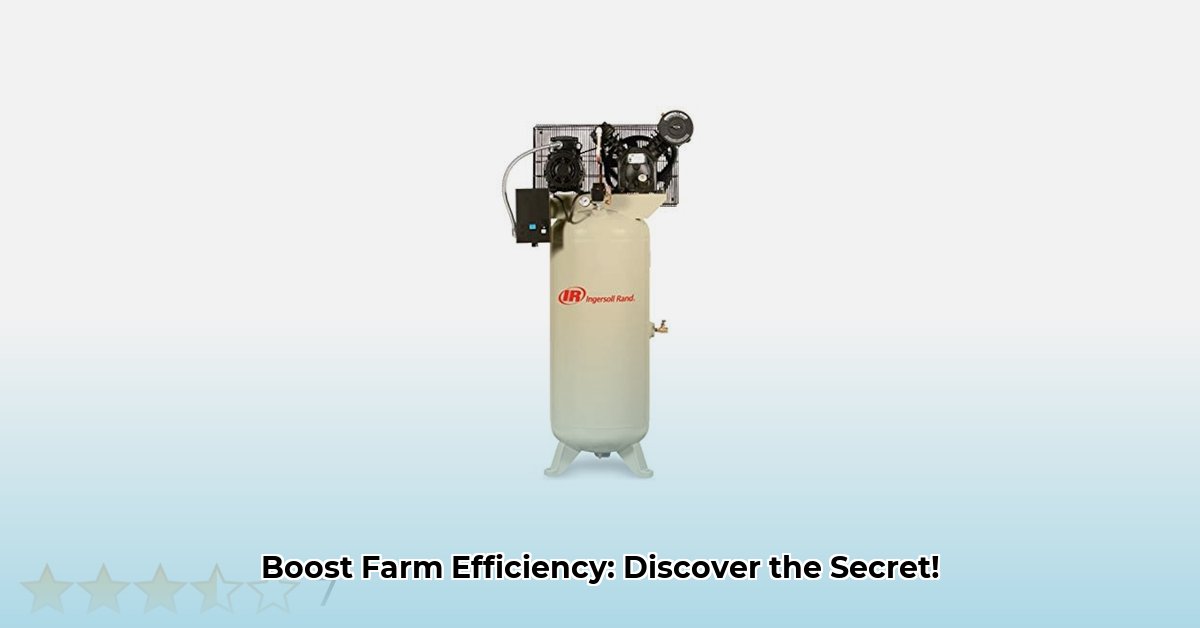
Choosing the Right Air Compressor for Your Sustainable Farm
An air compressor is a surprisingly versatile tool for boosting your farm's efficiency and embracing sustainable practices. But choosing the right one is key. Don't just grab the cheapest option; consider your specific needs and the long-term benefits. This guide will help you navigate the options available at Tractor Supply. What are the most important factors to consider when selecting an air compressor for your farm? For more on air compressor reels, check out this resource.
Key Factors for Air Compressor Selection
Several key specifications will determine the air compressor’s suitability for your farm’s needs. These factors directly impact efficiency and longevity, crucial aspects of sustainable agriculture. Let's break down the essentials:
CFM (Cubic Feet per Minute): This measures the volume of air the compressor delivers per minute. Higher CFM means faster inflation and operation of pneumatic tools. Think of it like engine horsepower – more power means quicker work. Higher CFM is beneficial for tasks like quickly inflating large tractor tires.
Horsepower (HP): This indicates the compressor’s power output. Higher HP compressors handle more demanding tasks and larger tools without strain. More horsepower translates to increased durability and longer lifespan, crucial factors in sustainable agricultural practices.
Tank Size: A larger tank capacity means fewer on/off cycles, leading to longer operational times and reduced wear. Less frequent cycling translates to a quieter compressor and potentially extended lifespan, contributing to sustainability goals.
Tractor Supply's IR Air Compressor Options: Tractor Supply offers a variety of IR air compressors. Carefully compare models based on CFM, HP, tank size, and your specific needs before making a purchase. Understanding the specifications and comparing options is crucial for making an informed decision. Are you primarily inflating tires, or do you require a compressor powerful enough to operate pneumatic tools regularly?
Air Compressors in Action: Practical Applications for Sustainable Farming
Beyond tire inflation, air compressors offer a surprising range of applications that promote efficient and sustainable farming. Let's explore how they contribute to responsible agriculture. How can this seemingly simple tool impact the various aspects of sustainable farming?
Tire Inflation: Maintaining proper tire pressure is critical for fuel efficiency. Under-inflation leads to increased fuel consumption, higher operating costs, and increased soil compaction, damaging the soil structure and potentially impacting crop yields. Regular tire pressure checks and inflation with an air compressor contribute to fuel savings and soil health. Dr. Emily Carter, Professor of Chemical and Biomolecular Engineering at Princeton University, emphasizes that “Precision in agriculture directly correlates to resource efficiency”.
Pneumatic Tools for Efficient Repairs: Air-powered tools like nailers and staplers are significantly faster and often less physically demanding than manual alternatives. For example, rapid fence repairs reduce downtime and potential material waste, contributing to both efficient farm management and minimal environmental impact.
Precise Pesticide/Fertilizer Application: Air-powered sprayers allow for targeted application, minimizing chemical overuse. Precise spraying prevents runoff, protects water resources, and reduces the environmental impact associated with excessive chemical use. This accurate application also maximizes the effectiveness of treatments, reducing the need for repeat applications.
Equipment Cleaning: Compressed air efficiently cleans equipment, reducing water usage compared to traditional washing methods. Efficient cleaning prevents corrosion and extends equipment lifespan, reducing replacement needs, and promoting resource conservation. This aligns with the principles of reducing waste and increasing longevity.
Safety and Maintenance: Essential Practices for Sustainable Compressor Use
Safe and responsible use extends the life of your air compressor, maximizing your investment and minimizing waste. Regular maintenance also promotes efficient and safe operation, ensuring its long-term value. How can we ensure the safe and efficient use of this equipment?
Safety Gear: Always wear appropriate safety glasses and hearing protection when operating an air compressor or using pneumatic tools. Eye protection is paramount to prevent injuries from airborne debris, while hearing protection minimizes the risk of hearing damage from noise produced by the compressor and pneumatic tools.
Regular Maintenance: Regularly inspect hoses and fittings for leaks, and ensure the air tank is drained of condensation to prevent rust and maintain optimal performance. Regular maintenance helps prevent costly repairs and extends the lifetime of your compressor.
Proper Storage: After use, store your air compressor in a dry, protected area to prevent damage from dust, moisture, and extreme temperatures.
Cost and Environmental Impact: A Sustainable Investment
While there's an initial investment cost involved, the long-term benefits of an air compressor far outweigh the price, especially within the context of sustainable agriculture. Let's assess the cost versus the environmental and economic advantages. How does the initial investment translate into long-term savings and environmental benefits?
Return on Investment (ROI): Fuel savings from properly inflated tires and the increased efficiency of pneumatic tools will quickly offset the initial purchase cost. The reduced need for repairs and the extended lifespan of your equipment further contribute to positive ROI.
Environmental Benefits: Reduced fuel consumption, minimized chemical use, and efficient water usage contribute to a significantly smaller environmental footprint. This commitment to eco-friendly practices is a key component of sustainable farming.
By carefully considering the factors outlined in this guide, you can select and implement an air compressor effectively and sustainably on your farm, improving your efficiency, reducing your impact on the environment, and ultimately improving your bottom line.